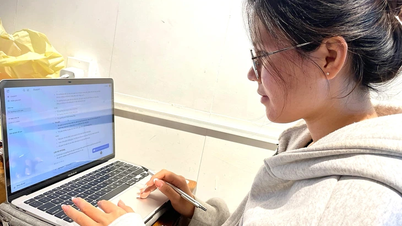
As advanced AI systems become increasingly ubiquitous, students will need to learn how to use AI critically, ethically and in a way that is fit for purpose and context - Photo: RMIT
Dr. Greeni Maheshwari - senior lecturer at RMIT University - stated so in the article "Factors influencing students' intention to accept and use ChatGPT in highereducation : A study in the context of Vietnam", published in December 2023 on Springer.
The study analyzed data collected from 108 participants, including undergraduate and graduate students from public and private universities in Vietnam. The results showed that perceptions of ChatGPT's reliability and intelligence did not affect students' intention to use it for learning.
The study also found that students were more likely to accept and use ChatGPT when they found it convenient and easy to use, despite the fact that ChatGPT had limitations such as its lack of ability to provide up-to-date information.
Dr. Maheshwari believes that educational institutions can deploy effective strategies to engage students in the appropriate use of AI tools.
“Given the many ethical concerns surrounding the use of AI in education, schools can play a key role in ensuring responsible use of AI,” she stressed.
Accordingly, instead of banning the use of AI, schools should seriously evaluate and embrace the potential educational benefits of this technology, while maintaining academic integrity.
At RMIT University, the school collaborated with Microsoft to develop an in-house AI tool called Val (short for Virtual Assistant for Learning).
In lesson planning, instructors can use generative AI tools to design story lines and analogies to explain lesson concepts, as well as generate examples, scenarios, and activities for the classroom.
In assessment, RMIT academic staff were advised to consider using some AI tools to design assessment tests and advise students, based on the school's guidance framework...
Schools should issue clear guidelines and codes of conduct for both learners and teachers, and give careful consideration to integrating AI into assessment.
Dr. Maheshwari
Using AI responsibly
From her research, Dr. Maheshwari recommends designing assessments that encourage responsible use of AI and maintain learners’ critical thinking skills and creativity during the assessment process.
Additionally, ongoing training and awareness programs can help learners and educators understand the ethical aspects of using AI in education, promoting a culture of responsible technology use.
“If we consciously act on these ethical considerations, educational institutions can harness the benefits of AI while maintaining ethical standards,” she suggests.
Source


































































































Comment (0)